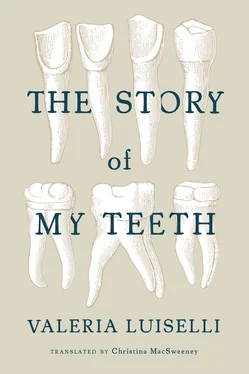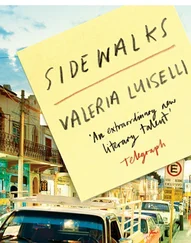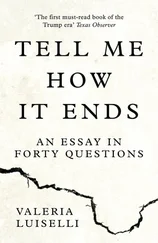Valeria Luiselli - The Story of My Teeth
Здесь есть возможность читать онлайн «Valeria Luiselli - The Story of My Teeth» весь текст электронной книги совершенно бесплатно (целиком полную версию без сокращений). В некоторых случаях можно слушать аудио, скачать через торрент в формате fb2 и присутствует краткое содержание. Год выпуска: 2015, Издательство: Coffee House Press, Жанр: Современная проза, на английском языке. Описание произведения, (предисловие) а так же отзывы посетителей доступны на портале библиотеки ЛибКат.
- Название:The Story of My Teeth
- Автор:
- Издательство:Coffee House Press
- Жанр:
- Год:2015
- ISBN:нет данных
- Рейтинг книги:5 / 5. Голосов: 1
-
Избранное:Добавить в избранное
- Отзывы:
-
Ваша оценка:
- 100
- 1
- 2
- 3
- 4
- 5
The Story of My Teeth: краткое содержание, описание и аннотация
Предлагаем к чтению аннотацию, описание, краткое содержание или предисловие (зависит от того, что написал сам автор книги «The Story of My Teeth»). Если вы не нашли необходимую информацию о книге — напишите в комментариях, мы постараемся отыскать её.
Highway is a late-in-life world traveler, yarn spinner, collector, and legendary auctioneer. His most precious possessions are the teeth of the "notorious infamous" like Plato, Petrarch, and Virginia Woolf. Written in collaboration with the workers at a Jumex juice factory,
is an elegant, witty, exhilarating romp through the industrial suburbs of Mexico City and Luiselli's own literary influences.
Valeria Luiselli
New York Times, Granta
McSweeney's
The Story of My Teeth — читать онлайн бесплатно полную книгу (весь текст) целиком
Ниже представлен текст книги, разбитый по страницам. Система сохранения места последней прочитанной страницы, позволяет с удобством читать онлайн бесплатно книгу «The Story of My Teeth», без необходимости каждый раз заново искать на чём Вы остановились. Поставьте закладку, и сможете в любой момент перейти на страницу, на которой закончили чтение.
Интервал:
Закладка:
THAT MORNING, THE MORNING of my brief captivity after the day of the auction, the first thing I noticed was the erection, whose faithful, shield-bearer presence returned me daily to the consciousness of the world. I tried to ignore it, and fell back to sleep. I don’t know how much time passed — seconds, perhaps minutes. When I began to regain my senses once again, the first thing I noticed was a pungent smell, like newly varnished wood, and I immediately felt an unbearable burning sensation between my eyes. I was lying on a hard, wooden surface, but was sweating profusely at the temples. My head was throbbing hard and fast, like a bird’s tiny heart. I then felt a strange swelling in my tongue, and, at the back of my mouth, the slightly metallic taste of blood. In a silence that only accentuated the irregular palpitations in my chest, I heard a faint purring, perhaps a muffled snore, almost a groan. I figured that I must be in a room where other people were asleep. I preferred not to open my eyes, thinking I’d perhaps been put in an old people’s home or a jail, and tried to get back to sleep, without quite succeeding.
The only thing I remembered after the auction in the church was having gone out into the street holding Siddhartha’s hand. At that moment, it crossed my mind that the last time I’d held it, his hand had fit inside mine. But I immediately stifled that thought, because it made me want to hug him, and I sensed he wouldn’t want to be hugged. We walked across the square, hand in hand, toward a car that was waiting for us on the corner, me trying to explain to Siddhartha how the hilarious inverted Red Riding Hood story worked. Siddhartha looked straight ahead and completely ignored me, the way parents ignore their children when they’re trying to explain complicated things to them. And that was all I remembered; everything else was a white effasure.
With my eyes still closed and trying to doze on, I slowly passed the tip of my tongue over the roof of my mouth. At that moment I went to pieces. When I attempted to move my tongue along the crescent of my teeth, as sacred, graceful, and hallowed as Bernini’s St. Peter’s Colonnade, I found a large, empty space. Nothing. Not a single tooth. Oh, Marilyn! I raised one hand to my mouth and opened my eyes. I sat up and noticed I had been lying on a bench. With the tip of my fingers, I felt my lips, my tongue, my palate, my naked gums. Nothing, not a single tooth. What would the great architect of St. Peter’s have done if he’d turned up at the Vatican one day and noticed that the awe-inspiring Doric columns forming a semicircle around the atrium that heralds the even more glorious heights of the monument to Catholicism were simply not there?
I looked around me, surveying the room where I’d been sleeping, and discovered a hell worse than the one that had installed itself inside my mouth. A clown of superhuman dimensions, projected onto a screen, was contemplating me with a vaguely gentle expression. I was overcome by fear, and though the most logical thing would have been to stand up from the bench and make a run for the half-open door of the small room, my modesty stopped me. My stubborn and — given the circumstances — inexplicable erection made it impossible for me to get to my feet. I scanned the room. From the screens on the four walls, four catatonic clowns were looking at me. I became certain I’d lost it, all my popcorn burnt. The other option, that I had perhaps been kidnapped and was being tortured, was much more ominous, given that this is a country where a human life is worth less than a ticket from Mexico City to Acapulco on the miserable Estrella de Oro line.
Straight in front of me was the enlarged image of a clown with his face painted white, a smile drawn in black around the mouth, and an undersized Chaplinesque bowler perched on top of his bald pate. I turned my head to the right. An image of the same exaggerated proportions showed a clown dressed in a brightly colored bodysuit, the greater part of his face painted blood red, and a bush of yellow hair sprouting from the sides of a huge, chunky noggin. The clown to my left wore a white bodysuit and a yellow duck-feather boa; his face was painted pink, and above his natural eyebrows was a spectrum of unnatural ones that ran up his forehead like a flight of differently colored stairs to a predominantly bald scalp. Needless to say, all three had the characteristic, forbidding button nose. I only gave the clown behind me a quick look, but was able to make out a black shoe with a broad sole, and a face painted red and black. Glimpsed out of the corner of my eye, he appeared to be the most sinister of the four, so I turned my head to the clown in front of me — the one with the white face and undersized bowler. Then, to my deep discomposure, this clown blinked.
I waited a few moments, gripping the edge of my bench, to see if he would repeat the action or if it was just that I was disoriented to the point of hallucination. Not only did the clown blink again, but suddenly, without him opening his mouth, a voice sounded from above my head:
Don’t you think that most things are so lovely, Fancioulle?
I didn’t reply, as he evidently couldn’t be referring to me. Highway, you’re an imbecile, I thought to myself. Speaking aloud, I managed — if weakly — to repeat: Imbecile.
I didn’t recognize my own voice. Without the solid frame of my teeth, the words issuing from my mouth were light, burbling puffs of air, the voice of an old man brought low. Then, that voice sounded again — slow, calm, almost cynical. It mimicked what I’d just said:
Im-be-cile.
Who are you? Where are you? I asked in alarm.
Give it up, Fancioulle.
Pardon?
Give up playing the imbecile, Fancioulle.
You’re confusing me with someone else. I am Gustavo Sánchez Sánchez, Highway, at your service.
Give it up, you bastard. Just tell me where you’ve hidden the makeup removal cream.
I don’t know what you’re talking about, I replied.
I then noticed that the voice was, in fact, coming from a loudspeaker in the ceiling, and that there were three other speakers, one in each corner of the room.
My cream, bloody Fancioulle. My face is cracking up and I want to take my makeup off.
I don’t use cream. I’m neither a woman nor a clown, and I don’t make myself up.
So you’re not a clown? Bloody, toothless, deceitful Fancioulle.
My name is Gustavo Sánchez Sánchez, but people call me Highway, out of affection.
Give it a rest.
And I’m the best auctioneer in the world.
Yeah? And what did you come to auction to us?
Not knowing how to respond, I held my tongue. The clown went on talking. He asked me if I knew the parable of the pearl, and, without waiting for me to reply, he began to give me a detailed explanation. He spoke to me as one does to a small child or a foreigner, pronouncing each word slowly and correctly:
Jesus said, “My Father’s kingdom can be compared to a person who had a treasure hidden in his field but did not know it. And when he died he left it to his son. The son did not know about the treasure either. He took over the field and sold it. The buyer ploughed the field, discovered the treasure, and began to lend money at interest to whomever he wished.” Do you understand this, Fancioulle?
Yes, of course. I went to Sunday School.
So what does it mean?
It means you should check what’s in your father’s field before you sell it.
Imbecile.
The clown blinked and gave a long, unembarrassed yawn. Then he said: You’re the most unexciting, stupid person I know, Fancioulle. He immediately closed his eyes and, it seemed to me, from the sound of his breathing, that he had fallen into a deep sleep.
I was certain that I had gone to hell. During the long family meals I had to endure in my childhood, my cousin, Juan Pablo Sánchez Sartre, who used to wear white plastic flip-flops and couldn’t hold his drink, would inevitably tell us — around the time when the dessert was being served — that we were hell. He used to shout at us, curse us; sometimes he threw objects or scraps of food left scattered on the tablecloth, especially soft grains of rice, and then left, slamming the door loudly behind him. We wouldn’t see him again until the next family gathering, when the same act was repeated, with slight variations. And so it went, every couple of months, until one day Juan Pablo committed suicide by having a heart attack during spinning class under the effects of a powerful amphetamine. End of family memory. But it could be that there was something in poor Juan Pablo’s theory. Since then, I’ve always thought that hell is the people you could one day become. The most frightening ones. For Juan Pablo, they were his most contemptible relations — the corrupt uncles, the aunts smelling of cosmetics, the unremarkable cousins. Other people are afraid of their enemies and superiors; others of the loonies who walk along the streets talking to themselves or the madwomen who scour their skin in public; some can’t tolerate the presence of the poor, amputees, vagrants. For me, there’s no one more ominous than a human being dressed up as a clown, probably because I’ve always been scared of being perceived as one. And there I was, toothless, lying on a bench in front of videotaped projections of enormous buffoons, dozing — or maybe depressed to the point of catatonia — being mistaken for one of them.
Читать дальшеИнтервал:
Закладка:
Похожие книги на «The Story of My Teeth»
Представляем Вашему вниманию похожие книги на «The Story of My Teeth» списком для выбора. Мы отобрали схожую по названию и смыслу литературу в надежде предоставить читателям больше вариантов отыскать новые, интересные, ещё непрочитанные произведения.
Обсуждение, отзывы о книге «The Story of My Teeth» и просто собственные мнения читателей. Оставьте ваши комментарии, напишите, что Вы думаете о произведении, его смысле или главных героях. Укажите что конкретно понравилось, а что нет, и почему Вы так считаете.












